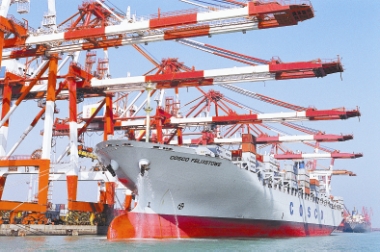 QINGDAO is sparing no effort in the advancement of its marine economy. These ambitions were vindicated in January when the State Council approved a national plan to grant Qingdao a pioneering role in the plan to develop the marine economy of the Shandong Peninsula. Having a 12,200-square-kilometer inshore area, Qingdao has 69 islands, 49 natural harbors and 711 kilometers of coastline, which gives the city a natural advantage in the industries of ocean fishing, harbor logistics, shipbuilding and coastal tourism. In addition, emerging industries like ocean biology, ocean medicine and desalination of seawater have sped up their development in recent years. The city contributes to around 25 percent of the output in the marine industry in Shandong Province. Qingdao has considerable talent in marine science research and development, being home to 19 academicians in the field. Spending on the research and development is predicted to account for around 2.5 percent of the city’s GDP by 2015. The city aims to become a core area in the Shandong Peninsula in terms of marine economy, as well as home to clusters of ocean-related industries. More than 130 experts have been invited to study the development of the marine economy. Another 200 experts have started drafting 18 plans. In the next five years, the city will invest a total of 600 billion yuan on the construction of over 300 projects including the Dongjiakou port industrial zone and modern service industrial zones in the east coast of Jiaozhou Bay. The Dongjiakou port industrial zone, which is under construction, has attracted projects totaling over 40 billion yuan. Besides, the city will further develop five industries including aquatic seedling planting, aquatic farming, high-sea fishing, aquatic product processing and leisure fishing. Meanwhile, the city government will provide a series of supporting policies to the development of the ocean economy, covering tax, finance, use of island and land, as well as opening-up. (Li Hao, Xu Jinpeng, Xu Bing, Su Wanming ) | 
